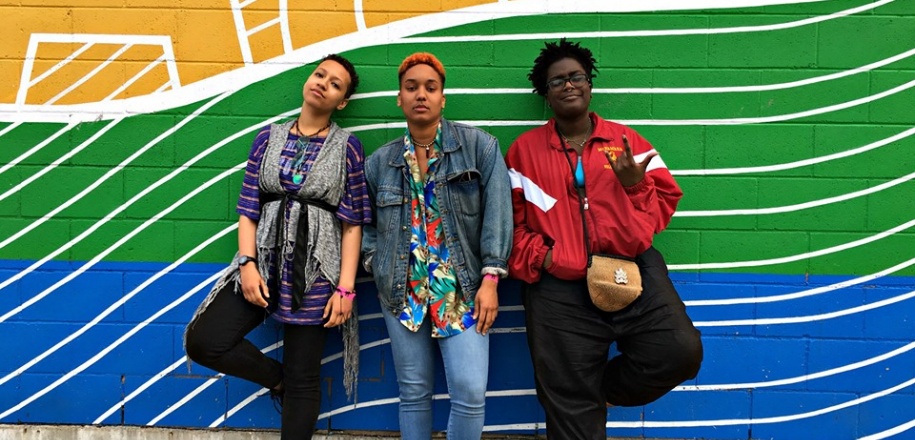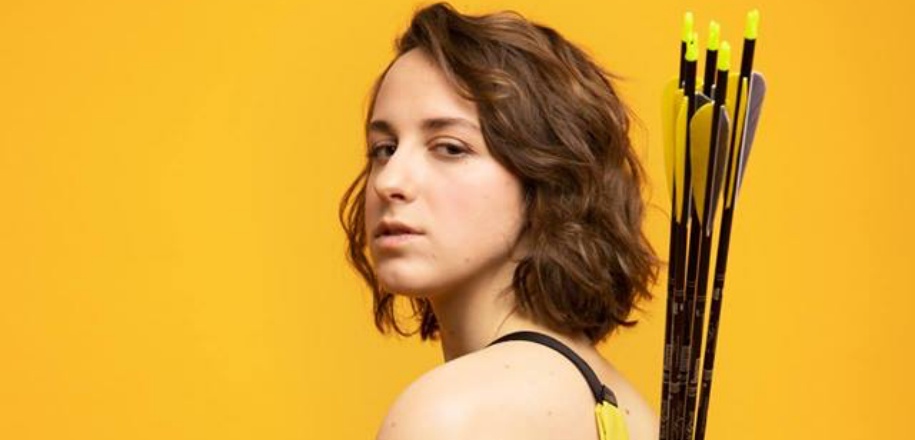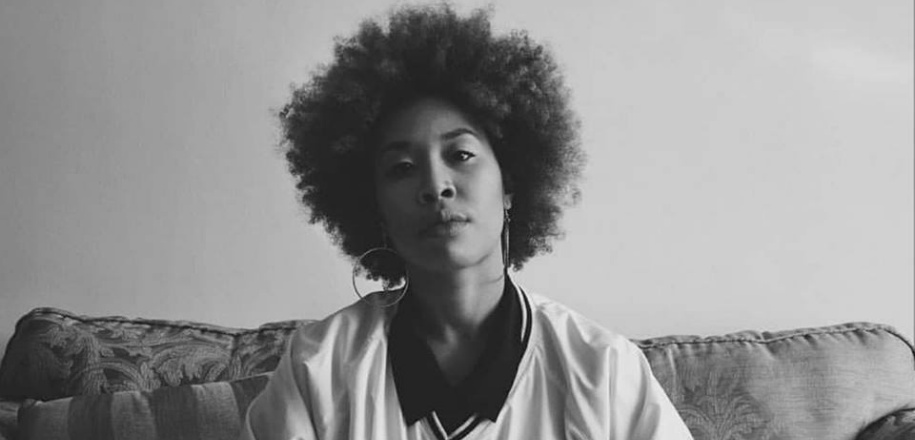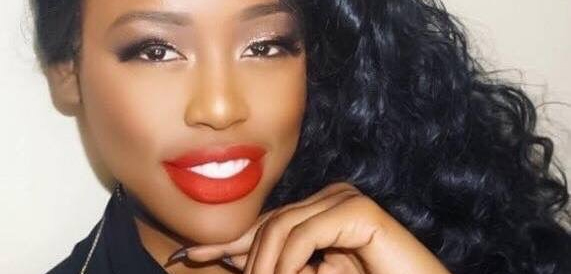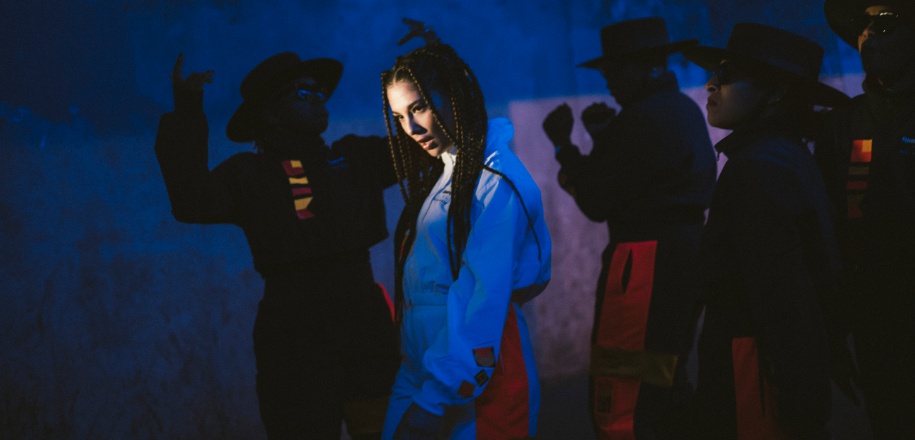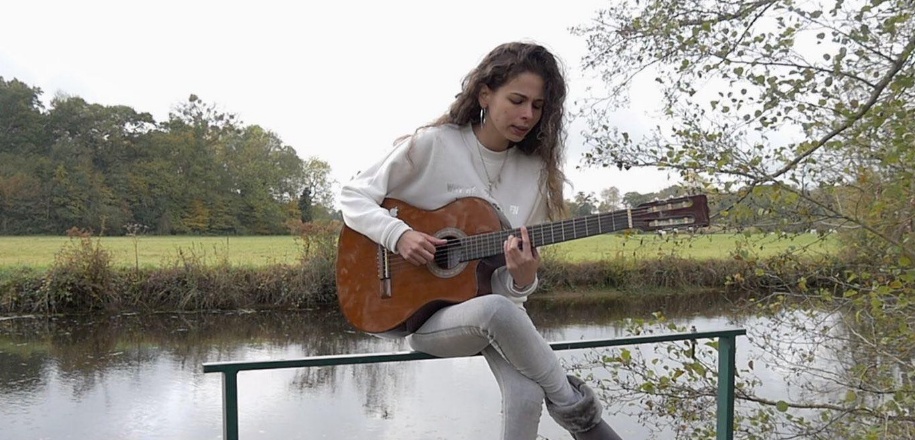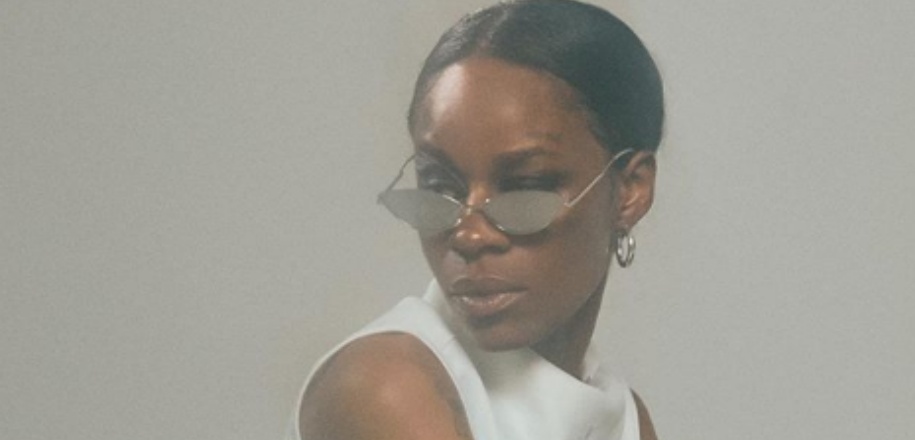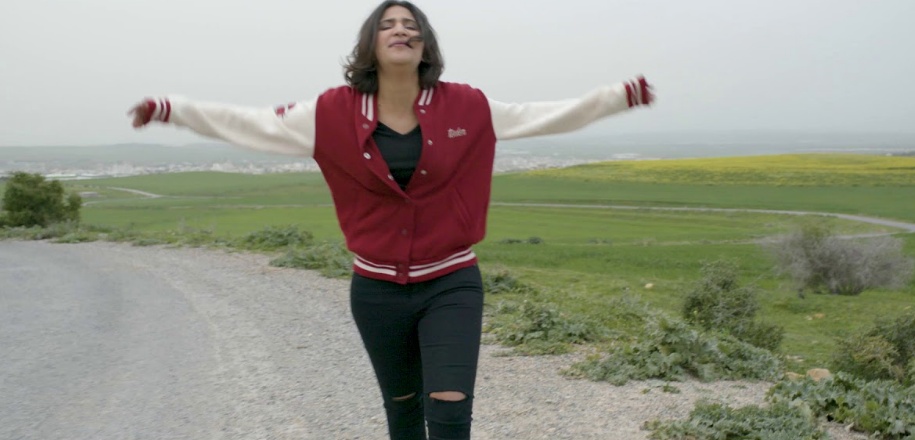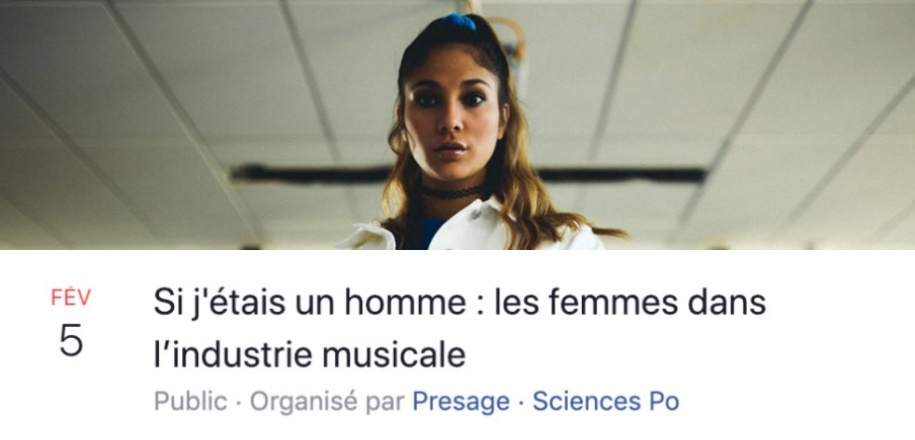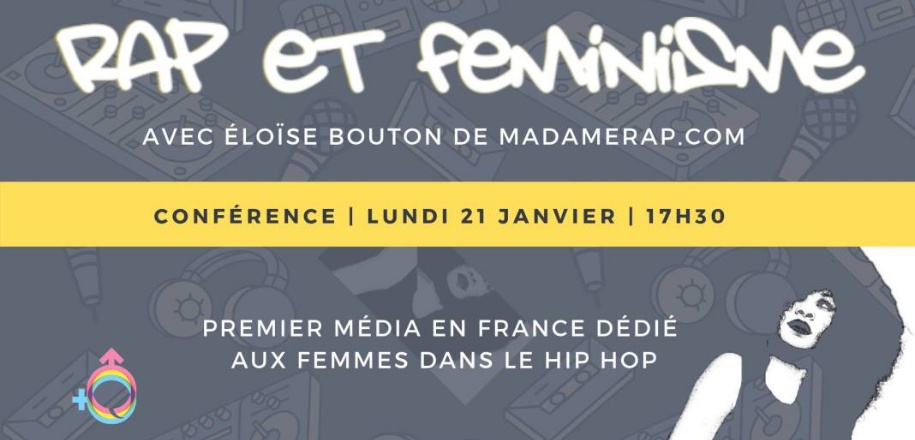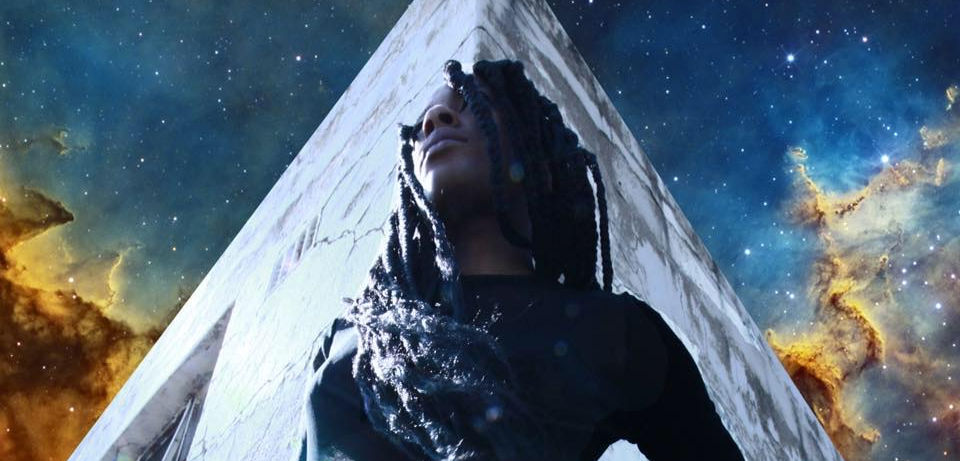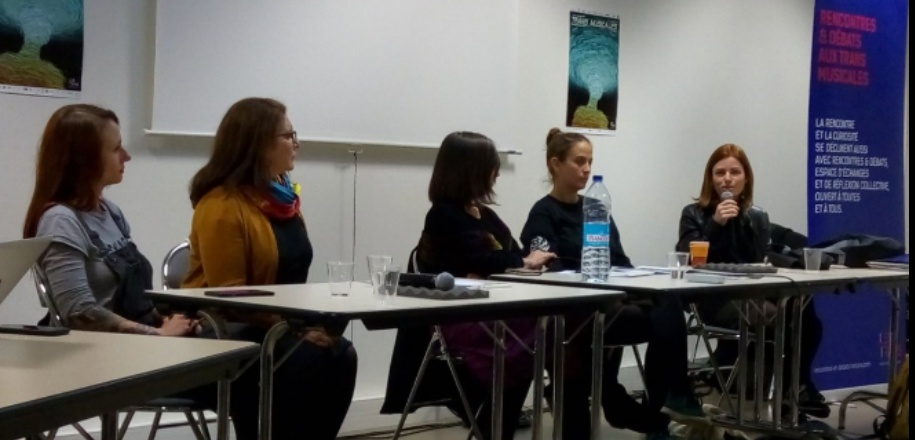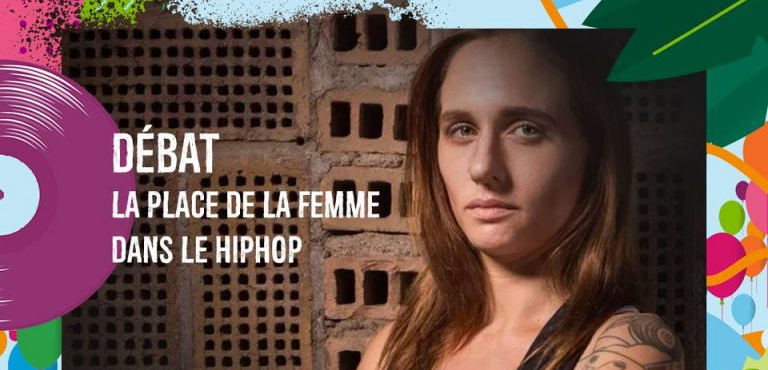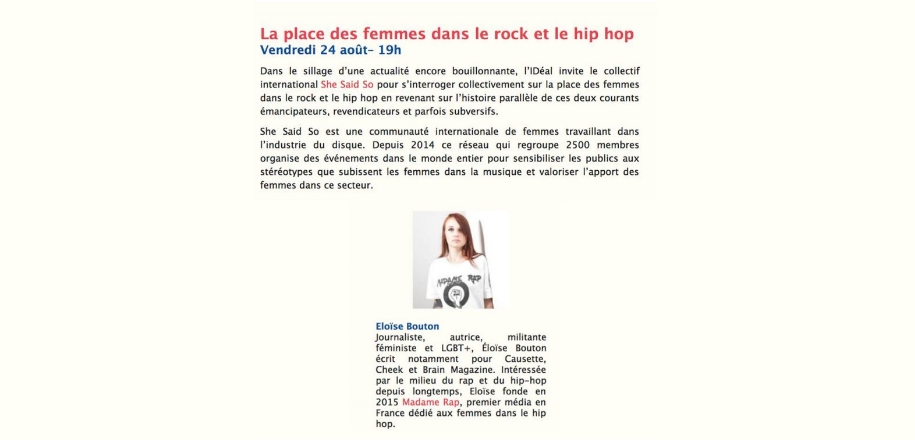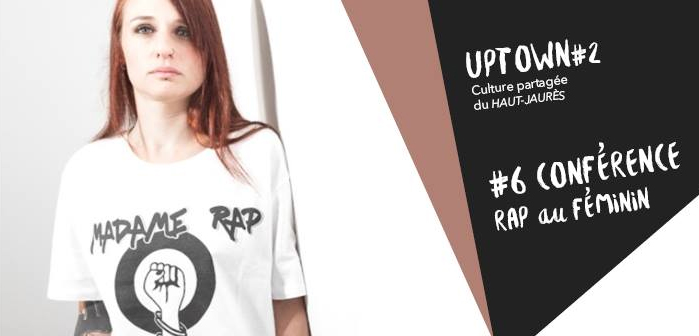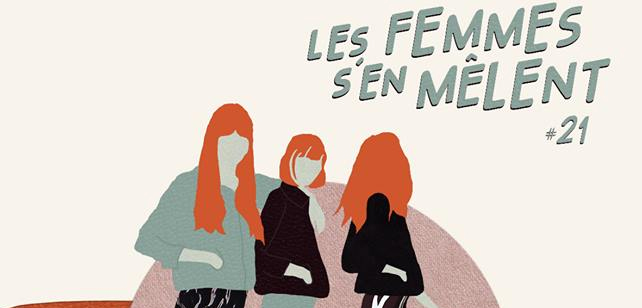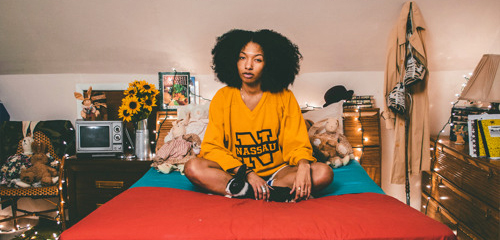NAME: E’Nigma
TRACK: Hard On Flow
YEAR: 2012
FROM: Botswana
Author: madamerap
Strange Froots
NAME: Strange Froots
TRACK: Green Apple
YEAR: 2015
FROM: Canada, Quebec
Marie-Gold
NAME: Maie-Gold
TRACK: Big Brain
YEAR: 2018
FROM: Canada, Quebec
Kayiri
NAME: Kayiri
TRACK: Coeur canelle
YEAR: 2018
FROM: Canada, Quebec
Cléomade
NAME: Cléomade
TRACK: Hell No
YEAR: 2019
FROM: Canada, Quebec
French rapper Chilla drops new freestyle “Dans le movie #1”
Before her upcoming single and album expected in 2019, French rapper Chilla drops the freestyle “Dans le Movie #1”.
The video is choreographed by Marion Motin, known for her collaborations with Madonna, Stromae and Christine and The Queens, directed by Christopher Hanany, who worked with Givenchy et Yves Saint Laurent and sponsored by Reebok.
© Martin Colombet
Dynämiite
NAME: Dynämiite
TRACK: Quirky
YEAR: 2018
FROM: Belgium
Lov’Nee : “Rap has become more and more popular in Martinique”
24-year-old West Indian female rapper Lov’Nee told us about her musical education, her influences and how she supports gender equality with her music.
Can you introduce yourself?
My name is Lov’Nee, I am 24 years old. I am West Indian, of a Guadeloupean father and a Martinican mother. I’m always in a sunny mood and have been passionate about music since I was young. I learned to play guitar when I was 12, which made me want to learn to play bass, drums and other instruments. I like different music genres and try to highlight my culture through these different styles.
When and how did you discover hip hop?
I grew up listening to hip hop. I discovered this music thanks to artists like The Fugees with their track Ready Or Not and Killing Me Softly. Classics, as we say, with a real hip hop vibe and concrete messages. Missy Elliott, a huge rapper, who had a lot of influence on how I viewed hip hop because I liked her flow. And also Snoop Dogg, who will always remain one of the kings of hip hop. He is unmissable and will always be a reference in my musical universe.
You are a singer, a rapper and a musician. How do these three activities complement one another? Did you start them at the same time?
I didn’t start them at the same time. When I was younger, I had the chance to discover the rap band IAM as well as the femcee Diam’s, who completely changed how I viewed French rap. I began to write a few texts without taking myself too seriously. Those were my first raps.
I started to play more instruments when I entered a music class in school. I could put what I learned into practice by integrating the different styles of local bands. These live performances reinforced my desire to make music and make it a living. When I arrived in France, I felt the need to write my own texts and haven’t stopped writing ever since.
So, these three activities are very complementary. I had the chance to take the time to learn each of them and today I would like to gather them on several projects.
How do you compose your songs? Do you produce your own tracks or do you work with producers?
All the projects I released so far are collaborations. I don’t have a producer but I am surrounded by a team that guides me every day on my musical evolution.
What does the track “Pacificante” talk about?
I denounce the way some people behave in an inappropriate way. I met some of them and in this track, I tell them that I choose to keep only what’s best.
When you search the internet, you can find very little female rappers from Martinique. Why is that?
In Martinique, our culture is diffeerent. Dancehall and zouk have been the most popular music genres for a long time. For a few years, rap has become more and more popular. The West Indies are filled with talented artists of all ages who are hardly visible because too little of them manage to have a national or international career. In this hothouse, there are a lot of female rappers and I sincerely encourage them to pursue their dreams.
Who are the women who inspire you?
The three women who inspire me are:
Jocelyne Beroard, a major zouk artist and key member of the band Kassav. She is a strong woman who put her personality at the service of her music. She is a great example of success who inspires me and I thank her for that.
Diam’s, a great French rapper who I could relate to and made me see rap differently with her conscious rap, that was more subtle and less raw. She made me feel the emotion of her texts. I grasped the depth of her words and understood her story, which echoed mine.
The third woman is not famous but is definitely my model: it is my mother. Thanks to her, I learned how to be tenacious. She is passionate about music, loves to sing and was a back singer when she was young. It is partly thanks to her that I got involved in music. She passed down her passion to me with love. She has always believed in me and known how to value my learning and now, I am able to accomplish things I never thought I could.
Do you consider yourself a feminist? Why?
Gender equality really matters to me and I am very sensitive to injustice. I am not a feminist activist but I believe women are as capable as men to fulfil themselves as they wish. I encourage them as I encourage myself to reach my life goals, no matter what they are. That’s why some of my texts support the idea of equality.
What are your upcoming projects?
Keep on releasing new music for my followers, make myself known to those who haven’t had the opportunity to listen to what I do, blossom with my music. Also, work more on the visual dimension of my projects and music production. And maybe work on a mixtape?
What do you think of Madame Rap? What should be changed or improved?
I am proud to see that women can help each other. The role of women in rap is not perfect yet, but I truly believe that your media can contribute to change things. You encourage young girls and women to showcase their skills. Thanks for your relevance in music, we need it!
Kitsuné Kendra
NAME: Kitsuné Kendra
TRACK: Yako
YEAR: 2019
FROM: Gennevilliers, France
Cyrine J
NAME: Cyrine J
TRACK: Mahmouta
YEAR: 2018
FROM: Paris, France
Panel discussion – Women in the music industry
Panel discussion at Sciences Po Paris, February 5, 2019.
With:
• Chilla, artist
• Éloïse Bouton, journalist, founder of Madame Rap
• Mathilde Cottebrune, director of international development, Universal Music France
• Sébastien de Gasquet, chief administrative officer, Universal Music France
• Faustine Kopiejwski, journalist, co-founder of Cheek Magazine
• Sophie Rosemont, journalist, writer of Girls Rock
• Réjane Sénac, politist, director of research at the French National Center for Scientific Research (CNRS) at Cevipof Sciences Po, member of Presage.
Conference – Rap and feminism
Conference at Sciences Po Bordeaux, January 21, 2019
What’s the link between rap and feminism? Rap is often criticized for its sexism. For Éloïse Bouton, hip hop and feminism are not incompatible: that’s what she will talk about in her conference!
Yugen Blakrok: “I think I’m more of a womanist”
A leading figure of South African rap, Yugen Blakrok told us about her experience in hip hop, how she ended up on the Black Panther soundtrack and her second album Anima Mysterium that will be out on February 1st, 2019.
When and how did you discover hip hop and start rapping?
I discovered hip-hop through TV, SA gets a lot of content from the US. I was drawn to the conscious and militant vibe that the 90s era had. But I really started rapping cause I couldn’t dance.
Your track “Opps” was featured on the “Black Panther” soundtrack. What did this change for you as an artist?
That feature threw me straight into the eye of the mainstream. Platforms that were previously inaccessible were suddenly open to my shit. It also brought people that would have had a hard time finding me closer into orbit.
You’ve always worked with SA producer Kanif The Jhatmaster. How did you two meet and how do you work on a track?
We met about nine years ago, at a Robo the Technician show in Soweto. We work through energy. Light, thought, sound are all waves and we’re into it, the frequencies we vibrate at. The vibe is everything. I’ve worked with and still collaborate with other producers, we’ve just got a chemistry of our own going. Sometimes the beats influence the lyrics and other times, the lyrics will dictate where the beat goes, it’s a conscious and continuous cycle of inspiration.
Your second album Anima Mysterium will be released on February, 1, 2019. What should we expect?
Expect a shadow-world built from word and sound. Dense lyrics and intricate production…for the seeker.
You’ve been active on the SA hip hop scene for a decade. Are there many female rappers in South Africa? How are they perceived?
We are many. At this point, I don’t think we care how we are perceived.
Do you consider yourself a feminist? If so, what kind of feminism do you most relate to?
I think I’m more of a womanist.
Who are your female role models and why?
I don’t have role models but I admire certain qualities in people. Tenacity, strength, conviction and authenticity are virtues that I’m drawn to in women. In my journey specifically, I’ve found that those are the things that get me through the most difficult situations so I have an affinity for women who display the same characteristics in whatever field they’re in. I’ve been lucky to meet quite a large number of women like that.
What are your upcoming projects?
My second album Anima Mysterium drops in February through IOT Records. I’ve also done a few features on some upcoming albums for 2019. Keep an ear out.
What do you think of Madame Rap? What should be changed or improved?
I think it’s a great and inclusive platform, especially within hip-hop and the focus on marginalized groups is not only welcome but refreshing as well.
Find Yugen Blakrok on Facebook, Bandcamp, Twitter and Instagram.
Panel discussion – Women turn up the volume
Panel discussion in Rennes organized by H/F Bretagne and the Transmusicales de Rennes, December 8, 2018.
This panel discussion aims to highlight a few invisible women. Which strategies do they implement? Which obstacles do they have to overcome? How can we use the tools they built to make gender equality move forward efficiently in our field?…
Debate – The role of women in hip hop
Debate at the Solidarités festival in Namur, Belgium, August 25, 2018
Since hip hop was born at the end of the 1970’s in the Bronx in New York, the movement has been male-dominated. But with time, women made their way into hip hop and many female artists now have the success they deserve…
Panel discussion – The role of women in rock and hip hop
Panel discussion at the Le Cabaret Vert Festival in Charleville Mézières, August 24, 2018
Conference – Why I am a feminist and I love rap
Conference in Brest at Badseeds Recordshop organized by Boogie Down during the Uptown Sessions festival, June 8, 2018.
Madame Rap at Les Femmes S’en Melent #21
For the second year, Madame Rap is pleased to team up with Les Femmes S’en Mêlent festival !

See you in Paris at La Machine du Moulin Rouge :
– March 15 for a panel discussion at the Bar à Bulles about “Rap, a space of freedom for women?”, hosted by Éloïse Bouton with:
– Stélyna (rapper)
– D’ de Kabal (co-founder of the 1990’s rap band Kabal, writer and theater producer)
– Emmanuelle Carinos (doctoral student in social sciences at the CRESPPA, co-founder at the Ecole Normale Supérieure of La Plume et le Bitume, a seminar dedicated to stylistics in rap texts)
– Karim Hammou (researcher at the CNRS, writer of the book Une histoire du rap en France and the blog Sur son rap).
– March 17 for an all-female rap line-up booked by Madame Rap with the concerts of KT Gorique, Blimes Brixton and Reverie.
You can learn more about the festival here and buy tickets here.
Asha Griffith: “Without Black struggle, there would be no hip hop or jazz”
Madame Rap asked the American rapper and singer Asha Griffith to tell us about her experience in hip hop and jazz and her collaboration with The Wolphonics, a project founded by French saxophonist Fabrice Theuillon, who are going to release their album “The Bridge” on September 14.
How did you discover hip hop and jazz?
My grandfather used to play jazz music, Bob Marley, doo wop and other “oldies” when I was younger. That was the first time I remember hearing jazz. I liked his jazz selection (probably because I heard the songs so many times), but I wasn’t listening to jazz on my own at that point–only with him. As far as hip hop goes I really can’t remember. I probably heard hip hop on the radio. I was born in the 90’s so hip hop was pretty popular by the time I was able to listen to music on my own.
When and how did you start rapping?
My dad encouraged me to rap when I was 10 years old. He wanted me and my younger brother (who was 5 at the time) to make an EP. He produced the music and I co-wrote the lyrics to the songs. We went to the studio and everything. We even had performances at local events and sold our cd’s and posters. The EP was called “Me and My Little Brother”. I wasn’t ready for the artist management side of things– sometimes I wanted to watch cartoons instead of practicing so the whole rapper thing didn’t last long. I wanted out so by the time I was 11, I was no longer a rapper lol.
What about tap dancing?
I started dance lessons at a local dance studio in New Jersey. I did all dance styles from 5 to 17 years old, but tap was my favorite. I realized I really liked tap around 11.
How did you meet Fabrice Theuillon and joined The Wolphonics project?
Fab found my music on Soundcloud. I uploaded my first mixtape, “Masterbait” on the site. If you haven’t heard it yet, lend me your ears for a second and check it out. Ok, so yea, he found my music online and sent me an email saying he was from Paris, and wanted to meet to talk about featuring me on an album he was working on. I was a little apprehensive at first, but we met up in Brooklyn a few days later and over the next year we collaborated on a few songs and then he flew me out to Paris for the first Wolphonics show. We’ve been building ever since.
What would you say is the common ground between hip hop and jazz?
Culture & Expression. Jazz and Hip hop is Black American music-an extension of African music. Without Black struggle and oppression in America there would be no hip hop or jazz. What people love about both styles is the authenticity. It’s transparent. It’s real. It’s raw. That’s what makes it so amazing.
You come from New Jersey. How is the female hip hop scene like over there?
There’s no “female scene” or “male scene”. There are really talented women creating waves in NJ. Felisha George is one of my favs in the hip hop community back home. A lot of singers dabble in rap too, but again, there’s no exclusive scene for women.
Do you consider yourself a feminist? If so, what kind of feminism do you most relate to?
I believe in political, economic, and social equality. I’m not aware of all the different kinds of feminism….Let me google this–I’ll be right back…hmmm I don’t totally relate to any of the labels I found. I can say that I’m not radical or a man-basher.
Who are your female role models and why?
My mother. I know her personally and I know how hard she’s worked for what she has.
What are your upcoming projects?
I’m working on an album–Moodswings! And an EP called Songs That Smell Good
What do you think of Madame Rap? What should be changed or improved?
Since I can’t read French my experience on the site is limited, but I think the layout has changed since the last time I visited the site. Has it? Either way, I’m digging it and I love the fact that Madame Rap supports women all over the world and not just in France.
Find Asha Griffith on her website, Soundcloud, Twitter, and Instagram and with The Wolphonics on Facebook.


